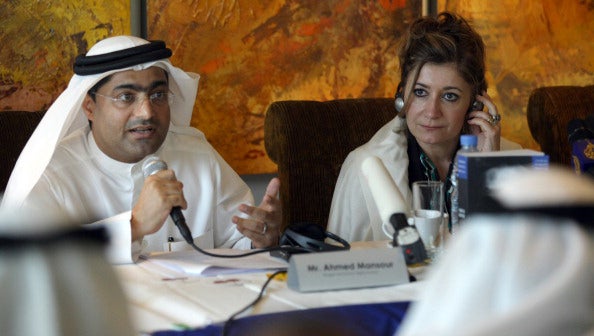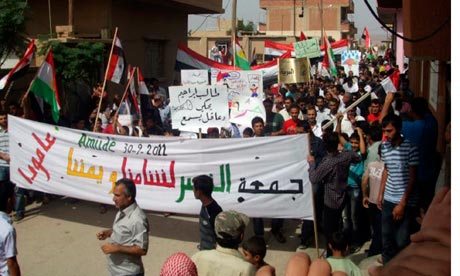By Tyler Yates
Impunity Watch Reporter, Middle East
ABU DHABI, The United Arab Emirates — Five activists charged with insulting state officials are facing ongoing prosecution in the United Arab Emirates.
 Human Rights activist Ahmed Mansoor speaks at press conference in Dubai on Jan. 26, 2011 (Photo courtesy of Human Rights Watch).
Human Rights activist Ahmed Mansoor speaks at press conference in Dubai on Jan. 26, 2011 (Photo courtesy of Human Rights Watch).
Ahmed Mansoor, Nasser bin Ghaith, Fahad Salim Dalk, Ahmed Abdul-Khaleq, and Hassan al-Khamis have been charged with committing crimes of instigation, breaking laws and perpetrating acts that pose a threat to state security, undermining the public order, opposing the government system, and insulting the president, the vice president and the crown prince of Abu Dhabi.
One of the men, Ahmed Mansoor, faces additional charges for supporting a petition advocating for wider powers for the UAE’s quasi-parliament.
The defendants deny all the charges.
The men’s lawyers have complained about the secrecy of the first four hearings, and their inability to adequately cross-examine state’s witnesses. State officials opened up the trial to the public on Sunday, but critics of the trial were not satisfied.
“If this was the showcase hearing, we can only imagine what previous hearings were like,” said Samer Muscati, a researcher with Human Rights Watch. “This is more a political theater than a trial.”
The trial is unprecedented for the small gulf Arab nation. The United Arab Emirates is a young wealthy country ruled under a revered hereditary leadership. Political expression is minimal.
The incident was a small tremor brought on by the larger Arab Spring movement that incited similar outbursts throughout the region. It is likely the fear of further incidents that has led the state to respond the way it has.
Rights groups dispute whether or not there is actually enough evidence for the state to have brought the action to be tried in Abu Dhabi’s Federal Supreme Court, which is usually used for charges like terrorism and forgery.
Due to the type of court this action has been brought in, the men will have no right of appeal. The lack of due process, and other procedural mishaps has many rights groups
Government supporters, who are camping in a park outside of the court in support of the trial, have called the action of the five men un-nationalistic.
Amnesty International, Human Rights Watch, Front Line Defenders, and the Arabic Network for Human Rights Information have teamed up for a campaign – the first of its kind – to urge the UAE to drop the charges against the men.
A verdict is expected at next week’s hearing. If the defendants are found guilty they face up to five years in prison, except Mansoor who faces up to nine years if found guilty of his additional charges.
For more information, please see:
Arabian Business — UAE activists boycott court over ‘unfair trial’ — 3 Oct. 2011
Wall Street Journal — UAE Trial of Activists Enters Home Stretch — 3 Oct. 2011
Arab Times — UAE Activists Trial ‘Unfair’: Rights Groups — 2 Oct. 2011
CNN — Activists on trial for insulting UAE president — 2 Oct. 2011
Human Rights Watch — UAE: Trial of Activists ‘Fundamentally Unfair’ — 2 Oct. 2011
Wall Street Journal — United Arab Emirates Trial Attracts Scrutiny — 30 Sept. 2011


